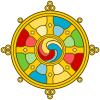Tibetan horn
Appearance
| Part of a series on |
| Tibetan Buddhism |
|---|
 |
The Tibetan horn or dungchen (Tibetan: དུང་ཆེན།, Wylie: dung chen, ZYPY: tungqên; Mongolian: hiidiin buree; Chinese: 筒欽; pinyin: tǒng qīn) is a long trumpet or horn used in Tibetan Buddhist and Mongolian buddhist ceremonies. It is the most widely used instrument in Tibetan Buddhist culture. It is often played in pairs or multiples, and the sound is compared to the singing of elephants. Tsultrim Allione described the sound:
It is a long, deep, whirring, haunting wail that takes you out somewhere beyond the highest Himalaya peaks and at the same time back into your mother's womb.[1]

See also
[edit]References
[edit]- ^ Allione, Tsultrim (1986). Women of Wisdom. London: Arkana. p. xiv. ISBN 1-85063-044-5.
External links
[edit]- Movie about making Tibetan horns in Nepal
- Scientific Movie on the sound characteristics, history and notation
Wikimedia Commons has media related to Dungchens.
